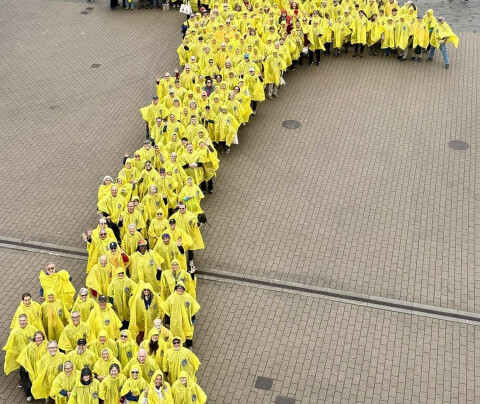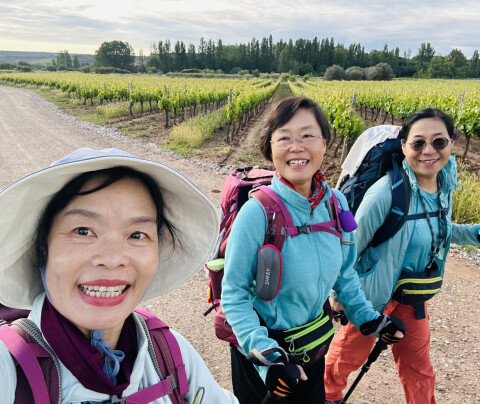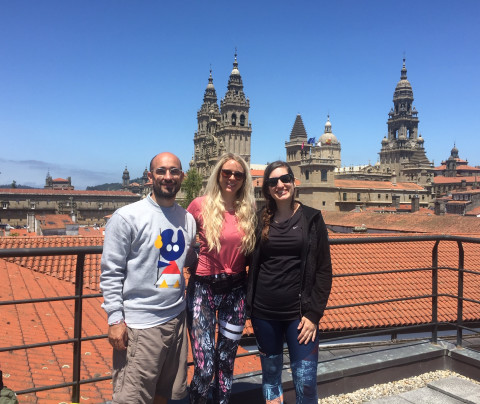Camino Teammates
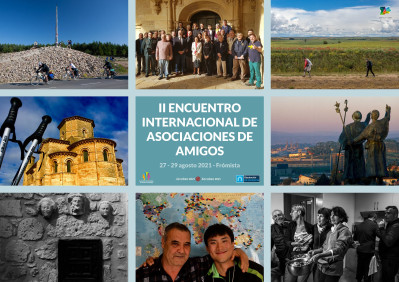
The II INTERNATIONAL MEETING OF ASSOCIATIONS OF FRIENDS OF SAINT JAMES WAY started on August 27 in Frómista, an emblematic place of the Romanesque art and the French Way. Organized by the Association of Municipalities of the Camino de Santiago (AMCS), it was attended by members of associations, institutions and companies involved in the Camino de Santiago, such as Correos.
The church of Santa María del Castillo, an Asset of Cultural Interest, hosted the meeting that brought together 17 foreign organizations convened to analyze first hand the situation of the Camino after COVID 19.
It was the first meeting after the health crisis and the second organized by the Association after the one held in Carrión in 2019.
After the opening day with the president of the Provincial Council of Palencia, Ángeles Armisén, the general director of Tourism, Estrella Torrecilla and the deputy mayor of Logroño, Adrián Calange, on the 28th the working days started.
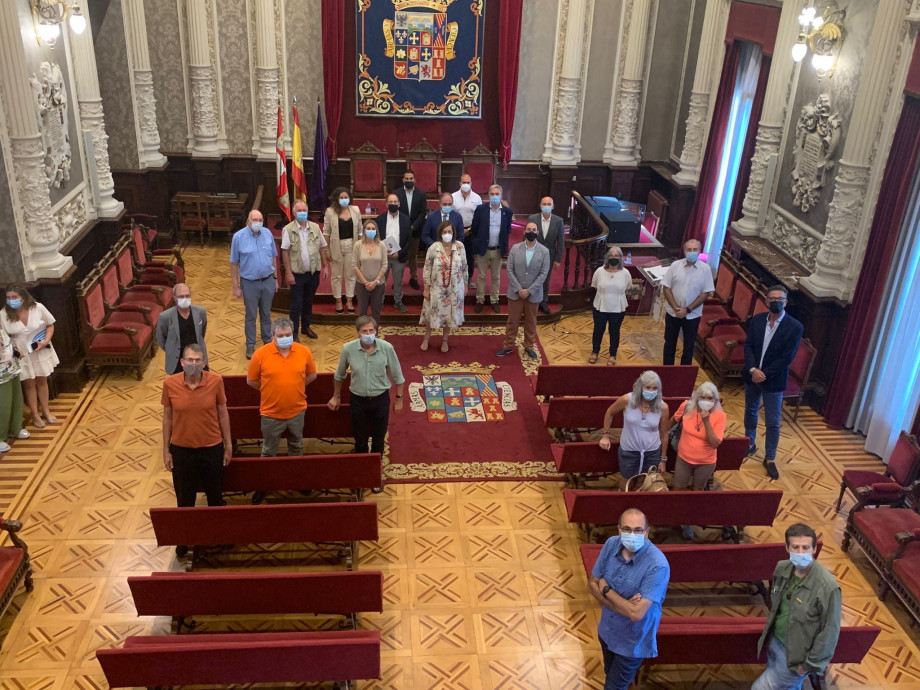
Organized in different sessions, the meeting focused mainly on 3 issues to be analyzed: the Way of St. James with the pandemic, the external vision of the Associations, and practical actions to be developed on the French Way of St. James.
THE CAMINO DE SANTIAGO IN TIMES OF COVID
José Manuel Rodriguez Montañés, historian and member of the Scientific Committee of the Association of Municipalities of the Camino, began his speech by analyzing the pandemic within a historical context in which the Camino coexisted with other pandemics (plague, etc.), and also in the actions carried out by associations, hostels, individuals, etc. to save the pilgrims who were walking the route in that time of forced confinement. A collective effort of coordination and collaboration of organizations that characterized these first moments of alert experienced in our country.
The COVID changed the aspect of the Camino: some establishments did not open, many hospitaleros could not come, protocols and mechanisms had to be created to promote a safe Camino....
And here arose a difficulty inherent to the territorial organization of our country: that of the division of different localities, provinces, communities... with different regulations and the reflection that in the Camino we must think globally since, according to Rodriguez Montañez, we must assist in a global way to a global phenomenon.
INFORMATION AND SECURITY ON THE ROAD TO SANTIAGO
The key elements pointed out during the COVID crisis were 2: information and security. Information to be able to know the real situation of the crisis at all times and the different measures of confinement in the country, and security, to work from all the areas involved to offer the maximum possible security once the routes were reopened.
In this context of coronavirus, other issues were also highlighted during the Meeting:
- INTERNATIONAL SOLIDARITY led by many International Friends of the Camino Associations that donated economic resources to be able to provide screens, gels, etc. to many hostels on the Camino. An example of this is the Canadian Association, which was able to raise more than 30,000 euros in donations.
- TECHNOLOGY. There was a need to use technology so that pilgrims could get updated information, such as real time information on the number of available spots in hostels. Although there were also other views on this point, as highlighted by Pascal Duchene, president of the Belgian Association, who said that it could also be a mistake to recreate at all costs the technological environment on the Camino because "the 2.0 world is perhaps what the pilgrim seeks to abstract, to free himself, and in his approach he seeks the human". In relation to this point, the president of the Federation of Associations of Friends of the Camino took advantage of the meeting to announce the launch of a new Digital Credential from the Federation.
- THE TRADITIONAL HOSPITALITY. One of the points discussed at the previous meeting in Carrión was once again in the spotlight as one of the most essential elements of the Camino. Rebeca Scott, American member of the international fraternity of the Camino, highlighted her human experience of helping pilgrims in those moments, when shelters were opening to take care of the pilgrims who were doing the Camino. In times of crisis in which the business hostels were closed, the traditional hostels were once again essential to attend to the pilgrims who resumed their steps towards Compostela. That is why Juan Carlos Pérez, president of the Association of Friends of the Camino de Astorga and the FICS, insisted once again that traditional Jacobean hospitality should be recognized as "Intangible Heritage of Humanity" by UNESCO.
- COMMUNICATION CAMPAIGNS. Many of those attending the meeting emphasized that the pandemic has been a point zero in the Camino. The Camino was working by itself, but from 2021 onwards the communication must be very accurate by the institutions. Different legislations from each community etc, could be an obstacle to this. Hence the need for accurate information with a common line. At this point the campaign RESPIRA HONDO, carried out by the Association of Municipalities with Correos was highlighted. The lack of unified and concentrated information to be able to advise pilgrims was a demand of the representatives of the Associations, such as Rosana Montani, from the Association of Argentina, or Lesley from the Camino Society of Ireland, who explained that for foreigners it was complicated to know the updated information due to the different regulations applied by each autonomous community. Lea Pennock, from Canada, also explained the campaign launched by her Association to keep its members informed and united: MY STAY HOME CAMINO.
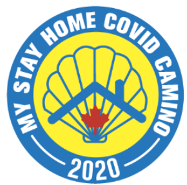
- THE SAFE CAMINO. AN INSURANCE ON THE ROAD. Is it safe to walk the Camino de Santiago? The interventions carried out by Commissioner Jesús del Amo, of the Police, and by Commander Pablo Esteban, of the Civil Guard, made it clear with numbers and programs put in place, such as the Jacobean Security Plan, that the Camino de Santiago is safe. At this point Francisco Singul, from Xacobeo, also highlighted the insurance launched this year by the Xunta de Galicia to cover possible incidents with the COVID that pilgrims may have in the Galician community.
- THE GREAT DISSEMINATION WORK OF THE INTERNATIONAL ASSOCIATIONS. The different associations were able to highlight the actions they carry out annually with all their members: from routes, Jacobean Days, talks, etc. or even the issuance of certificates of their pilgrimages in countries such as Germany, which can serve as motivation to follow the route to Santiago. The edition of magazines, web pages with complete information about the Pilgrims' Routes and services, newsletters, story contests such as those launched in Chile, etc. were always put together with a shared objective: to help pilgrims in the preparation and realization of their pilgrimage, and to create and promote activities and studies about the pilgrimage. As the Trier Association - St Jakobus Bruderschaft - emphasized, "we will continue to promote the Way of St. James and motivate people with their concerns - especially in times of pandemic - to undertake the pilgrimage".
BACK TO THE WAY OF SANTIAGO
"We are pilgrims. The most important thing is to be able to return to the Camino". This is how Lea Pennock began her speech, because of the limitations that many countries have to be able to leave their countries and come to the Camino, and that could be the summary of a meeting that served to meet again, physically and virtually, members of associations, institutions and companies with a common goal: to continue working for and with the Camino de Santiago.
As stated by the Association of Friends of the Camino de México, "Walking together, walking more". And with this philosophy of collaboration the Meeting in Fromista was closed.
CORREOS was present at this meeting and in it we could also hear the recognition of the work done in times of COVID, both offering daily updated information from our blog (in Spanish and English), and responding to the many pilgrims who contacted us through our Social Networks, in which we also carried out awareness campaigns and mutual support as #COMPARTETUCAMINO.
In those moments when we could not carry out our logistical work, from El Camino con Correos we continue to maintain our commitment and involvement with the Jacobean Routes and above all, with the pilgrims who have done, are doing or will do the Camino.
Your email address will not be published.
Mandatory fields are marked with *




